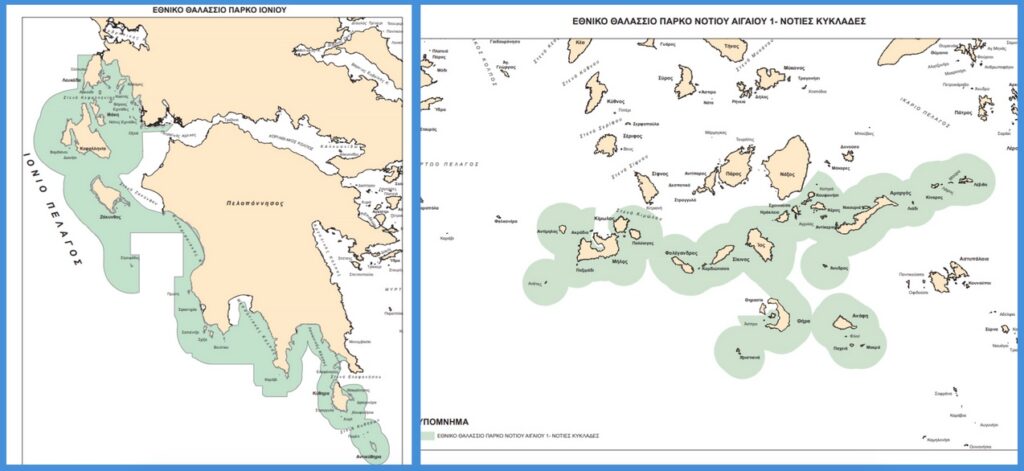Greece’s two new marine parks in the Ionian and South Aegean seas are now official. Confirming the relevant report by the newspaper “Parapolitika,” the prime minister made the related announcements before the public’s… summer swimming season. Upon hearing this pre-announced development, Turkey reacted by raising tensions and threatening retaliation.
Read: Mitsotakis implements his UN commitment: Greece fortifies its seas
The marine parks
The empty nets of Greek fishermen, resulting from overfishing and the destructive mechanical trawling that devastates marine biodiversity, pushed the government to adopt this promising measure that carries an environmental focus but also significant geopolitical implications. National Marine Parks are networks of interconnected protected areas. Their creation offers significant additional advantages compared to the previously isolated protected areas of the Natura 2000 network. Their purpose is to preserve unique biodiversity, protect and restore habitats, and promote awareness about the marine environment.
The beginning will be made with the park in the South Aegean, covering a large area in the Cyclades. From Milos and Ios, to Anafi and Amorgos. Cumulatively (in the Ionian and Aegean), we’re talking about a marine area of 27,500 square kilometers. Until September 22, the Special Environmental Studies are being put to public consultation, and the goal is for the institutionalization to be completed by October. “They will allow us to achieve the goal of protecting 30% of our territorial waters by 2030. (…) And perhaps most importantly, within these marine zones the extremely destructive practice of mechanical trawling will be prohibited,” stated Kyriakos Mitsotakis.
Monitoring challenge – Drones enter the battle
Of course, the big challenge is monitoring the new measures. Whether, that is, these specific areas will be supervised in practice or if they will be left to their fate. According to parapolitika.gr sources, authorities will deploy drones, radar, satellites, and the coast guard. “The question is whether we’re talking about paper parks, that is, parks that exist only on paper, or areas where there will be a functional mechanism for combating illegal fishing,” Anastasia Miliou, research director of the Marine Protection Institute “Archipelagos,” tells parapolitika.gr. This “functional mechanism” doesn’t exist – though it should – in Greece’s already existing marine parks (in Alonissos and Zakynthos). “A functional mechanism means substantial monitoring in practice. It means there must be fines for illegal and uncontrolled fishing if we want to put an end to the depletion of marine resources,” Ms. Miliou concluded.
Turkish threats
As expected, Turkey reacted upon hearing the news, although it has no say in the matter. The neighboring country’s Foreign Ministry commented that “unilateral actions in closed or semi-closed seas like the Aegean and Mediterranean should be avoided,” announcing that Turkey will reveal its own plans in the near future. The Anadolu agency boldly reported that Ankara is expected to proceed with declaring its own marine parks. Obviously, the Turks aren’t suddenly interested in the marine ecosystem.
They’re attempting to “gray-zone” the area, provoking Athens’ strong reaction. In its announcement, the Greek Foreign Ministry clarifies that “references to closed or semi-closed seas are completely groundless” and that “the legal status in the Aegean is clear. Greek sovereignty in this area is clearly and definitively defined by international treaty texts. (…) The exercise of rights stemming from Greek sovereignty is not subject to negotiation.”




